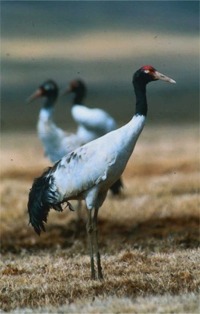 |
 |
The endangered black-necked crane © UNESCO/ RSPN |
 |
Conscious of the value and fragility of this outstanding natural environment, the Royal Government of Bhutan has adopted a policy of low-volume, high-value tourism. This policy has been particularly successful in protecting the country’s spectacular cultural and natural heritage while promoting community participation in ecotourism development and equal benefit-sharing among stakeholders. Established in 1987, the Royal Society for the Protection of Nature (RSPN) has worked with the World Wildlife Fund, the US MacArthur Foundation and the Bhutan Trust Fund for Environmental Conservation, implementing environmental education, awareness and conservation programmes throughout Bhutan. It enjoys the patronage of HRH the Crown Prince of Bhutan. The aim of the UNESCO / RSPN project is to develop an integrated conservation development programme in Bhutan’s Phobjikha Valley, which is home to the endangered Black-Necked Crane and to other wetland species. Phobjikha has a population of 5,000 people, mostly farmers living in the Valley’s 37 villages, and is a prime site for the development of culturally and environmentally responsible cultural and ecotourism. The project provides RSPN with training in programme management and skill building for local staff, and is developing a Crane Observation and Education Centre for visitors and local people and schoolchildren. It also helps to maintain the area’s trekking and nature trails, develop tourist products for the Phobjikha Valley and set up model community lodges and campsites.Thus members of the local community are involved in ecotourism development, learning skills and reaping economic benefits.
| 
